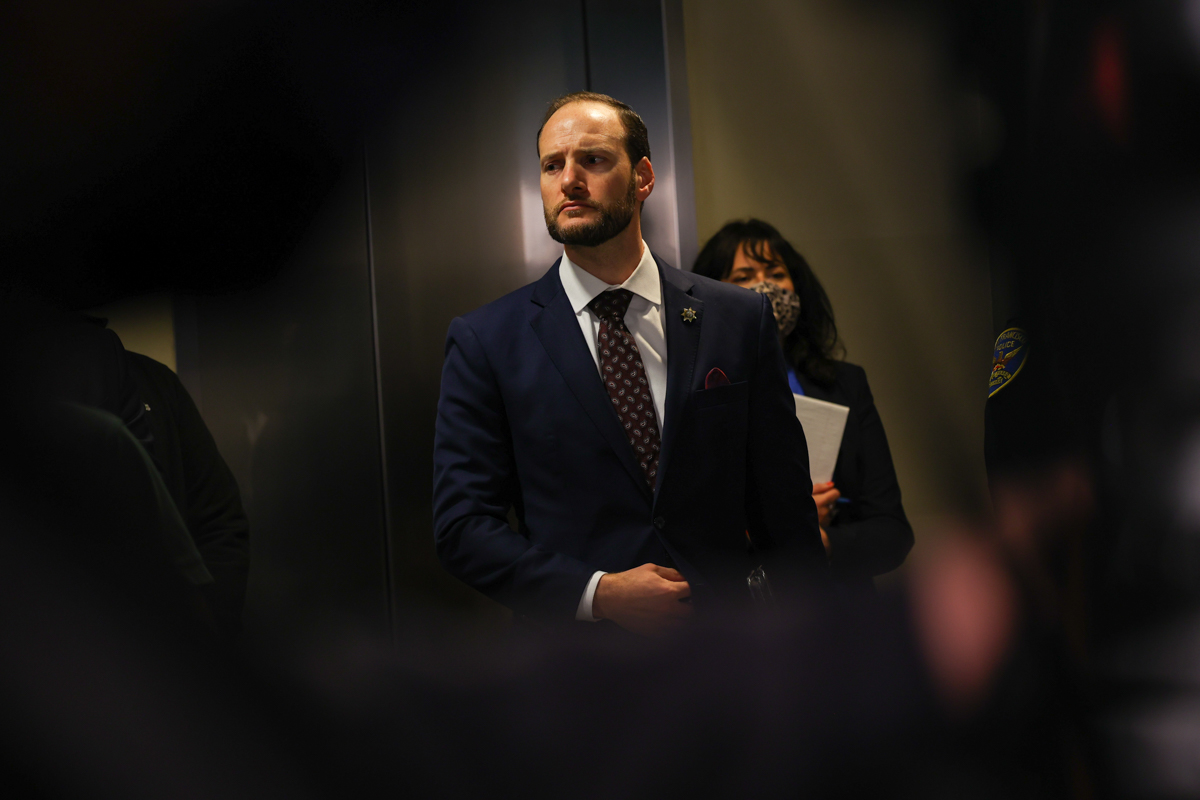District Attorney Chesa Boudin on Monday accused San Francisco police of using DNA evidence collected from sexual assault survivors to identify suspects in unrelated crimes, a practice he said raised legal and ethical issues and could dissuade reporting of sex crimes.
Boudin said he learned of the practice several days ago after an assistant district attorney discovered police allegedly used DNA evidence collected from a sexual assault survivor years ago to identify and arrest her in connection with a recent, unrelated property crime.
Boudin said the practice could compromise his ability to prosecute cases by violating the unreasonable search and seizure rules of the Fourth Amendment as well as Marsy’s Law, the state statute meant to protect the legal rights of crime victims.
“From a public policy standpoint it is my goal and my commitment to eliminate as many barriers as possible to victims of crimes coming forward,” Boudin said Monday at a morning press briefing at his office. “This sort of practice—whatever the intent behind it—clearly creates major deterrence to a group we know to be uniquely vulnerable and to a category of cases that is one of the hardest to successfully prosecute.”
Boudin announced his discovery Monday amidst an ongoing conflict with Police Chief Bill Scott, which escalated this month with the trial of a police officer accused of using excessive force. The two law enforcement officials accused each other of violating an agreement that makes the District Attorney’s Office the lead investigator of all police shootings, in-custody deaths and other serious uses-of-force in San Francisco.
In a statement, Chief Scott did not confirm the allegations and instead raised the possibility that the suspect “may have been identified through a DNA hit in a non-victim DNA database.” He said that the department’s “existing DNA collection policies have been legally vetted and conform with state and national forensic standards.”
However, the chief said he is committing to ending the practice “if it’s true that DNA collected from a rape or sexual assault victim has been used by SFPD to identify and apprehend that person as a suspect in another crime.”
“We must never create disincentives for crime victims to cooperate with police,” Scott said.
Reached by phone, Beverly Upton, a longtime advocate for domestic violence survivors in San Francisco, told The Standard she had never heard of police making an arrest using DNA evidence from a sexual assault victim.
“It’s disturbing,” Upton said. “I’ve urged the DA to speak with Chief Scott and to try to work on this. We want survivors to be able to trust and reach out for help if they need it.”
Dilara Yarbrough, an assistant professor of criminal justice studies at San Francisco State University, condemned the use of rape kit evidence for unrelated investigations.
“DNA from rape kits should not be used for any purpose other than to identify the perpetrator of sexual assault,” Yarbrough wrote in an email to The Standard. “Under no circumstances should a rape survivor’s rape test kit be used to arrest that survivor.”
Hadar Aviram, a professor of law at UC Hastings who specializes in criminal justice, also said she never heard of a similar situation before, but questioned whether the threat of being prosecuted for a future crime would dissuade victims from reporting sexual assaults.
“The experience itself is so traumatic that the prospect that they will potentially be subject to prosecution for a separate crime is going to be a pretty marginal consideration,” Aviram said.
Supervisor Hillary Ronen said Monday that she asked the City Attorney’s Office to draft legislation prohibiting police or any other city agency from using DNA evidence obtained from a sexual assault victim for any other purpose than investigating their case.
“It never occurred to me in my wildest dreams that DNA evidence from a rape kit would be used against the victim,” Ronen said. “We need to stop this practice immediately.”
State Sen. Scott Wiener, of San Francisco, also said he is considering making legislative changes at the state level if necessary to ban the practice.
